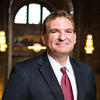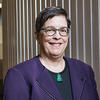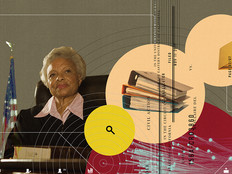30 State and Local Government IT Influencers Worth a Follow in 2019
The concept of federalism is central to the American republic, and it diffuses power away from Washington, D.C., and out to state capitals, major cities and towns across the country.
That means that there is a wide constellation of players who impact state and local governments and the technologies they use. There is a correspondingly large number of those who influence the conversation around state and local IT. They include governors, state and city CIOs, analysts, journalists and podcasters.
So, to help government IT pros stay in the loop, StateTech has sorted through the most influential state and local government IT voices on the internet. In response to an evolving industry and ever-changing technology, we’ve adopted a new approach to keeping track of the industry’s thought leaders, and have turned our Must-Read State and Local IT Blogger List into an “influencer list” that covers not just bloggers, but also Twitter personalities, podcasts, LinkedIn pros and those who use their social channels to get the word out.
Here is our curated collection of 30 state and local IT influencers, which we hope will be your go-to guide for keeping tabs on the latest in state and local government IT trends, smart cities and more. If you’re on the list, spread the news and grab our IT influencer cover image for your Twitter page!

Although he’s not a Twitter superstar, Nebraska CIO Ed Toner is one of the most well-respected voices across the state government technology landscape. For several years, he has offered regular (usually monthly) updates on how he and his office are approaching innovation, cloud adoption and the business case for IT decisions.

As both the CIO of Delaware and the former president of the National Association of State Chief Information Officers, Collins is a bright star in the state government IT firmament. Collis is active on LinkedIn, promoting happenings (IT-related and otherwise) in the First State.

Detroit is a city on the rebound, having emerged from bankruptcy protection and modernized its IT infrastructure under Niblock, who has been CIO of the Motor City since February 2014. Niblock keeps up an active Twitter presence and promotes news about how Detroit is reinvigorating itself.

In August 2018, New Jersey Gov. Phil Murphy named Noveck the state’s first chief innovation officer. Noveck, who is a professor at New York University’s Tandon School of Engineering, where she directs the Governance Lab, previously served as the deputy CTO for open government under President Barack Obama. Noveck has a robust Twitter following and regularly tweets about the intersection of tech and government services.

Before hanging out his shingle as the principal and founder of civic tech consulting firm B Squared Civic Solutions, Bennett was best known as the chief innovation officer for Kansas City, Mo., where he pushed for three years to get the city on the map as a smart city. Active on Twitter, Bennett is a great person to follow to stay informed on smart cities developments.

Sarasti serves as the CIO of Miami, where he has been driving innovation since 2016. The city recently upgraded its website and has been adopting mobile technologies for divisions like the Department of Public Works. He’s another rising star on Twitter when comes to civic innovation and smart cities.

Until November, Canellakis had served in various roles in the government of the city and county of San Francisco, most recently as chief innovation officer. She’s stayed active on Twitter since her departure and remains a consistent promoter of civic engagement and public service.

Hosted by John du Pre Gauntt, an analyst with a background in economics, “The Augmented City” podcast is a semiweekly podcast that focuses on city life in the age of artificial intelligence. It has been running since the summer of 2016 and explores the how culture and technology are colliding as AI evolves from being just another technology people use to something that is shaping how people live.

“The Smart Community Podcast” is a hub that brings together a wide range of voices to discuss all things smart city, smart town and smart region. Its tagline is “Making Smart Communities that are Accessible, Liveable and Sustainable for All.” Hosted by Australia-based engineer Zoe Eather, the podcast has notched 145 episodes since February 2018, covering everything from smart mobility to cybersecurity and digital transformation.

As global vice president of Government Insights and manager of the U.S. Federal Government and Worldwide Smart Cities and Communities Global practices at IDC, Clarke is one of the most connected and in-demand analysts around when it comes to government IT, and smart cities in particular. A frequent speaker at industry conferences, she brings a wealth of knowledge to the table, especially via her Twitter feed.

In addition to his expertise covering federal government IT, McCarthy, research director for IDC Government Insights, also brings his considerable analytical skills to bear when it comes to the state and local market. Active on LinkedIn, McCarthy is a font of knowledge and data when it comes to government IT trends.

“GovLove” is a podcast from Engaging Local Government Leaders about the people, policies and profession of local government. Interviews with everyone from city managers to interns aim “to learn more about their path into the public sector and highlight their work,” and “explore policy issues that impact local governments and the innovative solutions being used to address them,” according to the podcast’s website. The podcast has been running since 2015 and has 315 episodes in its catalog.

Doctoroff is the founder and CEO of Sidewalk Labs, a subsidiary of Google parent company Alphabet that focuses on smart city solutions, including the high-profile Quayside project in Toronto. He’s definitely someone to be connected with in the world of smart cities.

As president of U.S. regulated industries, Townes-Whitley is Microsoft’s point person for government affairs. She dives deep, not only into how the company’s cloud and artificial intelligence solutions can help agencies but also into technology’s impact on the environment and how to close the digital divide.

The U.S. Conference of Mayors is the official, nonpartisan organization of cities with populations of 30,000 or more, with each represented by its mayor. The organization’s Twitter account regularly provides updates on what mayors and cities are doing to drive innovation.

Hart, the managing editor of news site Axios, writes about smart cities and technology generally. She has a deep background covering tech as a reporter for Politico and The Washington Post, and also served as the press secretary for the Federal Communications Commission during the Obama administration. Follow her on Twitter for scoops on government technology news.

The National League of Cities is the “oldest and largest national organization representing municipal governments throughout the United States,” according to its website. Although not strictly focused on innovation and technology, the organization’s Twitter feed is a great one to follow to keep track of urban policy and priorities.

In November 2018, Polis was elected the 43rd governor of Colorado. Before getting into politics, Polis founded ProFlowers, an online florist, and he has made innovation a centerpiece of his agenda, including the launch of the Colorado Digital Service.

Reichental, the former CIO of Palo Alto, Calif., tweets regularly about emerging technologies, including digital twins and quantum computing. He currently serves as the founder and CEO of Human Future, a global business and technology education, advisory and investment firm.

Johnson is a seasoned government technology reporter who now serves as the managing editor for GovLoop. Active on both Twitter and LinkedIn, she is very tuned in to government IT tends.

Along with IDC, Frost & Sullivan is one of the premier market research and analysis firms out there when it comes to the Internet of Things and digital transformation. This is a great Twitter account for government IT leaders to follow to stay in touch with emerging technology trends.

The Center for Internet Security is a nonprofit aimed at providing cybersecurity tools and standards for private sector and public sector organizations. The nonprofit runs the Multi-State Information Sharing and Analysis Center, a key organization for cybersecurity in state and local government. With nearly 30,000 Twitter followers, the center is an influential voice when it comes to IT security.

UVA’s Link Lab researches cyber-physical systems for smart cities, as well as autonomous systems and smart healthcare. Follow the lab to stay up to date on cutting-edge smart city research and development.

Lohrmann, a cybersecurity thought leader, uses his blog on Government Technology to help state and local government leaders sift through the hype about IT security and focus on what they can practically do to keep their communities safe. He is active on Twitter and is a key voice to follow for cybersecurity news and trends.

Tratz-Ryan is a Gartner vice president of research and is responsible for intelligent urban ecosystem research, including on smart cities. A thought leader on smart cities and urban sustainability, she brings a unique perspective, highlighting the governance and perspectives needed to make smart cities successful for both cities and residents.

Holm, deputy CIO for the city of Los Angeles, is a major promoter of getting girls and women into IT and, of course, the City of Angels’ technology efforts. Holm is active on LinkedIn and, as the former evangelist for the White House’s open data initiative, is a huge proponent of open data.

An industry coalition aimed at accelerating smart city adoption, the group brings together technology companies, city officials, universities, research institutes, national laboratories, development banks and more. Look here for thought leadership on smart cities.

Part of the Industry Dive network, Smart Cities Dive covers smart city industry news and provides original analysis on the latest trends in the smart city arena. Its tech coverage focuses on wireless technology, autonomous vehicles, the Internet of Things and more. Stay tuned to the publication’s Twitter feed, which has nearly 145,000 followers, for smart news and trends.

If you work in public library, you need to follow David Lee King, the digital services director at the Topeka & Shawnee County Public Library. He regularly offers insights on how to incorporate technology into public library programs.

FirstNet, or the First Responder Network Authority, the first nationwide, high-speed broadband network dedicated to public safety, now has 1 million network connections and 10,000 public safety agency subscribers. Check out its Twitter feed not just for news on the development of the network but on developments in public safety technology as well.









